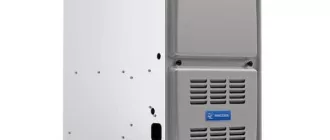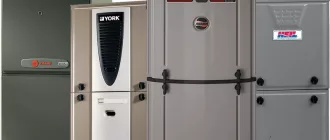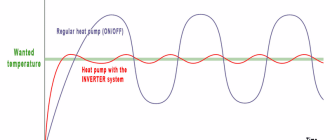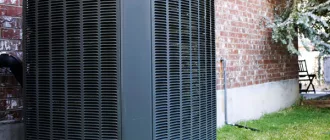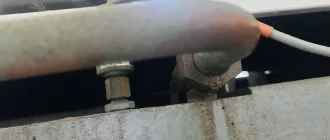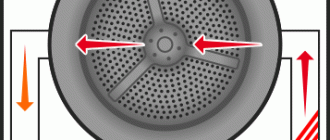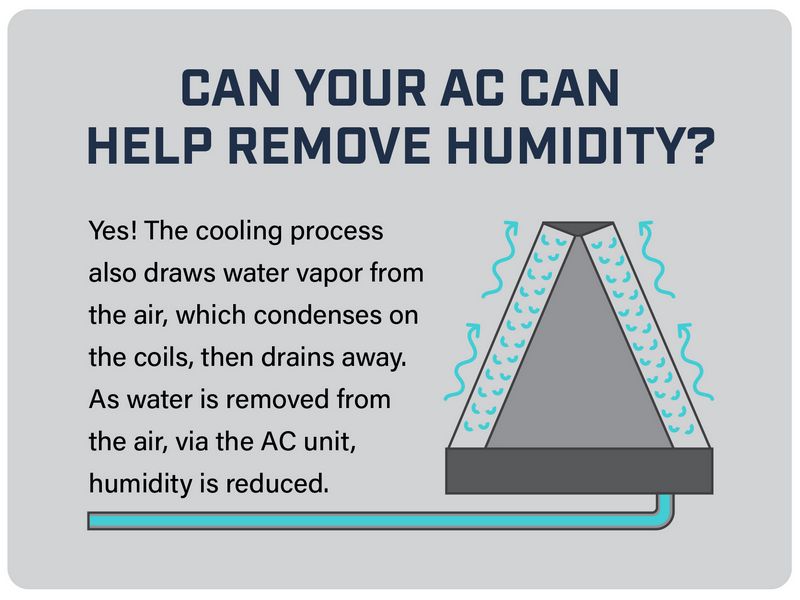
Does Humidity Affect My Air Conditioner?
Humidity is a factor that can greatly affect the performance of your air conditioner. When the air is humid, it means that there is a high amount of moisture in the air. This can make the air feel sticky and uncomfortable, and it can also affect the way your air conditioner operates.
One of the ways humidity can impact your air conditioner is by reducing its efficiency. When the air is humid, it is already holding a lot of moisture. This makes it harder for the air conditioner to remove additional moisture from the air. As a result, the air conditioner has to work harder and run for longer periods of time to cool the air. This can lead to increased energy consumption and higher electricity bills.
Another way humidity can affect your air conditioner is by causing condensation issues. When the air conditioner cools the air, it removes heat and moisture from the air. If the air is already saturated with moisture, it has a harder time absorbing the additional moisture that is being removed. This can cause excess moisture to collect in the air conditioner, leading to condensation issues and potential damage to the unit.
Humidity can also impact the overall comfort of your home. High humidity levels can make the air feel heavy and damp, even if the temperature is set to a comfortable level. This can make it difficult to cool down and can lead to feelings of discomfort. A properly functioning air conditioner can help to reduce humidity levels and create a more comfortable indoor environment.
In conclusion, humidity is an important factor that can impact the performance of your air conditioner. It can reduce efficiency, cause condensation issues, and impact overall comfort. It’s important to manage humidity levels in your home to ensure that your air conditioner can operate effectively and provide optimal cooling.
Why Humidity Matters for Your Air Conditioner
Humidity levels play a crucial role in the performance and efficiency of your air conditioner. Understanding how humidity affects your unit can help you optimize its performance and prolong its lifespan. Here are a few reasons why humidity matters for your air conditioner:
- Efficiency: High humidity can make your air conditioner work harder to cool your space. When the air is already saturated with moisture, it becomes more difficult for the air conditioner to extract it from the air. This can lead to reduced cooling capacity and increased energy consumption.
- Comfort: Excessive humidity can make your space feel hot and sticky, even when the temperature is set to a comfortable level. An air conditioner helps remove excess moisture from the air, reducing the humidity and creating a more comfortable indoor environment.
- Condensation: When warm air with high humidity comes into contact with a cold surface, such as an air conditioner’s evaporator coil, condensation occurs. This condensation can lead to water leaks, mold growth, and damage to your unit. Maintaining proper humidity levels helps prevent condensation-related issues.
- Air Quality: High humidity can promote the growth of mold, mildew, and bacteria, which can negatively impact the air quality in your space. An air conditioner helps remove excess moisture, reducing the risk of airborne contaminants and improving indoor air quality.
- Longevity: Excessive humidity can contribute to the wear and tear of your air conditioner over time. The increased workload and potential condensation issues can strain the components of your unit, leading to breakdowns and costly repairs. Maintaining proper humidity levels can help prolong the lifespan of your air conditioner.
Considering the impact of humidity on your air conditioner’s performance, it is important to monitor and control the humidity levels in your space. You can use a hygrometer to measure the humidity and consider investing in a dehumidifier or a whole-house humidity control system to help regulate humidity levels. Regular maintenance of your air conditioner, including cleaning or replacing filters, can also contribute to optimal performance in humid conditions.
Understanding Air Conditioner Performance
The performance of an air conditioner is determined by its ability to cool and dehumidify the air in a given space. Humidity plays a crucial role in the overall performance of an air conditioner, as high levels of humidity can impact its efficiency.
Humidity refers to the amount of moisture present in the air. When the humidity levels are high, the air feels damp and uncomfortable. This high humidity can make it more difficult for an air conditioner to effectively cool the space, as it must also work to remove the excess moisture from the air.
When an air conditioner is operating in high humidity conditions, it may take longer to reach the desired temperature and may have to work harder to do so. This can result in increased energy consumption and higher utility bills.
Additionally, high humidity can cause the air conditioner to produce less cool air, as the excess moisture in the air can interfere with the cooling process. This can lead to a decrease in comfort and a less effective cooling experience.
On the other hand, low humidity conditions can also impact air conditioner performance. When the air is too dry, it can cause discomfort, dry out the skin, and lead to respiratory issues. In these cases, an air conditioner can help to add moisture to the air through a built-in humidifier or by using a separate humidification system.
To optimize the performance of an air conditioner, it is recommended to keep the humidity levels within a comfortable range of 30% to 50%. This will help the air conditioner to cool the space efficiently and effectively while maintaining a comfortable environment.
In conclusion, understanding the impact of humidity on air conditioner performance is important for maximizing its efficiency and maintaining a comfortable indoor environment. By controlling humidity levels and choosing a suitable air conditioner, you can ensure optimal performance and energy savings.
The Impact of High Humidity
High humidity can have a significant impact on the performance of your air conditioner. When the air in your home is too humid, it can make the air conditioner work harder and less efficiently. This can result in higher energy bills and increased wear and tear on the system.
One of the main issues with high humidity is that it prevents the air conditioner from effectively removing moisture from the air. Excess moisture can lead to a variety of problems, including mold and mildew growth, musty odors, and damage to your home and belongings.
Here are some of the ways that high humidity can impact the performance of your air conditioner:
- Inefficient cooling: When the air conditioner is trying to remove moisture from the air, it has less capacity to cool the air. This means that it will take longer for your home to reach the desired temperature, and the system will have to work harder and consume more energy to achieve the same level of cooling.
- Increased energy consumption: As the air conditioner works harder to remove moisture, it will consume more energy. This can result in higher energy bills, especially during periods of high humidity.
- Shortened lifespan of the system: When an air conditioner operates under high humidity conditions for prolonged periods of time, the excess moisture can cause corrosion and damage to the system. This can lead to breakdowns and a shortened lifespan for the unit.
- Poor indoor air quality: High humidity can promote the growth of mold and mildew, which can negatively impact indoor air quality. Mold spores and other allergens can be circulated by the air conditioner, exacerbating respiratory issues and allergies.
To mitigate the impact of high humidity on your air conditioner, it is important to take steps to control indoor humidity levels. This can be done by using a dehumidifier, ensuring proper ventilation, sealing air leaks, and maintaining adequate insulation. Additionally, regular air conditioner maintenance, such as cleaning or replacing air filters and checking for refrigerant leaks, can help optimize performance and prevent issues related to high humidity.
How Humidity Affects Cooling Efficiency
Humidity is an important factor to consider when it comes to the performance of your air conditioner. High humidity levels can impact the cooling efficiency of your air conditioner, making it work harder and less effectively.
When the air is humid, there is more moisture in the air. This increased moisture can make it difficult for the air conditioner to extract heat from the air, as it has to remove not only the heat but also the moisture. As a result, your air conditioner may take longer to cool your home and may struggle to reach the desired temperature.
In addition to making your air conditioner work harder, high humidity levels can also make your home feel less comfortable. When the air is humid, it can feel sticky and muggy, even if the temperature is set to a comfortable level. This can make it difficult to relax and can lead to discomfort and decreased productivity.
To combat the negative effects of humidity on your cooling efficiency, it is important to manage the humidity levels in your home. One way to do this is by using a dehumidifier, which can remove excess moisture from the air. This can not only help improve the performance of your air conditioner but also make your home more comfortable.
Another option to consider is installing a central air conditioner with a humidity control feature. These air conditioners are designed to not only cool the air but also dehumidify it, helping to maintain a comfortable indoor environment.
In conclusion, high humidity levels can negatively impact the cooling efficiency of your air conditioner. It can make your air conditioner work harder, take longer to cool your home, and make your living space feel uncomfortable. To improve the performance of your air conditioner and create a comfortable indoor environment, it is important to manage the humidity levels in your home.
Humidity’s Effect on Air Quality
Humidity plays a significant role in maintaining good air quality in your home or workplace. When the humidity levels are too high or too low, it can have various effects on the air you breathe. Understanding these effects can help you take the necessary steps to improve indoor air quality.
High Humidity:
- Mold and Mildew Growth: Excessive moisture in the air creates the perfect environment for mold and mildew to thrive. These microorganisms can release spores and toxins into the air, leading to respiratory issues and allergic reactions.
- Dust Mite Infestation: Dust mites are tiny organisms that feed on dead skin cells and thrive in humid conditions. They are a common allergen and can cause respiratory problems, especially for individuals with asthma or allergies.
- Poor Indoor Air Quality: High humidity can cause the air to feel heavy and damp. This, combined with the presence of mold, mildew, and dust mites, can lead to poor indoor air quality, causing symptoms like coughing, sneezing, and throat irritation.
Low Humidity:
- Dry Skin and Respiratory Issues: When the air is too dry, it can cause dryness and itching of the skin. It can also lead to dryness of the respiratory system, resulting in irritated nasal passages, dry throat, and increased susceptibility to respiratory infections.
- Increased Allergens: Low humidity can cause an increase in airborne allergens such as dust particles and pet dander. These allergens can trigger allergies and worsen symptoms for individuals with existing respiratory conditions.
Improving Air Quality:
To maintain optimal air quality, it is important to control humidity levels. Using a humidifier or dehumidifier can help regulate humidity and prevent the negative effects mentioned above. Additionally, proper ventilation, regular cleaning, and maintenance of HVAC systems can also contribute to better air quality.
| Summer | 40-50% |
| Winter | 30-40% |
By maintaining appropriate humidity levels, you can ensure better air quality and create a comfortable and healthy indoor environment for yourself and your loved ones.
Condensation Issues in High Humidity
In regions with high humidity levels, air conditioners can face condensation issues. When the air is saturated with moisture, it becomes harder for the air conditioner to remove the excess humidity from the indoor environment. This can lead to several problems:
- Mold and mildew growth: High humidity provides the perfect environment for mold and mildew to thrive. When condensation forms on surfaces, such as walls, ceilings, or furniture, it creates a damp environment where mold and mildew can grow. This not only affects the aesthetic appeal of your home but can also pose health risks to you and your family.
- Reduced cooling efficiency: In high humidity, the air conditioner has to work harder to dehumidify the air before cooling it. This extra workload can reduce the cooling efficiency of the air conditioner, leading to decreased comfort and higher energy bills.
- Condensate drainage problems: When the air conditioner removes moisture from the air, it collects the condensate in a drain pan. However, in high humidity conditions, the condensate production increases, and if the drainage system is not properly maintained, it can lead to clogs or overflow. This can cause water damage to your home and potentially damage the air conditioner itself.
In order to prevent these condensation issues in high humidity, it is important to properly size your air conditioner for your specific needs and maintain it regularly. Additionally, using a dehumidifier in conjunction with your air conditioner can help remove excess moisture from the air and alleviate some of the strain on the air conditioner.
Problems Caused by Excessive Moisture
Excessive moisture in the air can lead to various problems for your air conditioning unit. These problems can potentially affect its performance and efficiency. Below are some common problems caused by excessive moisture:
- Reduced Cooling Capacity: When there is excessive moisture in the air, it can make it difficult for the air conditioning unit to effectively remove heat from the indoor environment. This can lead to a reduced cooling capacity, causing your air conditioner to work harder and use more energy.
- Inefficient Dehumidification: Air conditioners not only cool the air but also dehumidify it. Excessive moisture in the air can overload the dehumidification process, making it less efficient. This means that your air conditioner may struggle to maintain a comfortable humidity level indoors.
- Mold and Mildew Growth: Excessive moisture provides an ideal environment for mold and mildew growth. If your air conditioner is unable to effectively remove the excess moisture from the air, it can lead to the growth of these fungi. Mold and mildew can not only damage your air conditioning unit but also pose health risks to you and your family.
- Condensation Issues: When there is excessive moisture in the air, it can cause condensation issues in your air conditioner. This can result in water leakage, which can damage the unit and surrounding areas. Additionally, condensation on the cooling coils can hinder the unit’s ability to effectively cool the air.
- Increased Energy Consumption: When your air conditioner is struggling to remove excessive moisture from the air, it needs to work harder and run for longer periods to achieve the desired temperature. This can lead to increased energy consumption and higher utility bills.
It is important to address excessive moisture issues promptly to ensure the optimal performance and longevity of your air conditioning unit. Regular maintenance, such as cleaning the filters and coils, can help prevent the problems caused by excessive moisture. Additionally, using a dehumidifier in conjunction with your air conditioner can help maintain a comfortable humidity level indoors and alleviate the strain on your air conditioning unit.
Long-Term Effects of High Humidity on Your Air Conditioner
1. Mold and Mildew Growth:
High humidity levels can create a moist environment in your air conditioner, promoting the growth of mold and mildew. These microorganisms can thrive in the damp conditions and spread throughout your unit, causing damage to the components and reducing the overall efficiency of your air conditioner.
2. Increased Energy Consumption:
When there is excess humidity in the air, your air conditioner has to work harder to remove the moisture. This increased workload puts a strain on the system, causing it to consume more energy. As a result, you may notice a significant increase in your energy bills over time.
3. Reduced Cooling Capacity:
High humidity levels can affect the cooling capacity of your air conditioner. The excess moisture in the air makes it more difficult for the unit to extract heat from your indoor space, leading to reduced cooling performance. This can result in a less comfortable environment and may require you to run the air conditioner for longer periods to maintain a comfortable temperature.
4. Corrosion and Rust:
In humid conditions, the excess moisture in the air can cause corrosion and rust to develop on the metal components of your air conditioner. This can lead to damage to the coils, fins, and other vital parts, affecting the overall performance and lifespan of the unit.
5. Increased Wear and Tear:
Due to the additional strain caused by high humidity, your air conditioner may experience increased wear and tear on its various components. This can result in more frequent breakdowns, reduced reliability, and the need for costly repairs or replacements.
6. Decreased Indoor Air Quality:
When your air conditioner is affected by high humidity, it may struggle to effectively filter out airborne contaminants, such as dust, pollen, and pet dander. This can lead to a decrease in indoor air quality, potentially causing respiratory issues and allergies for those living in the space.
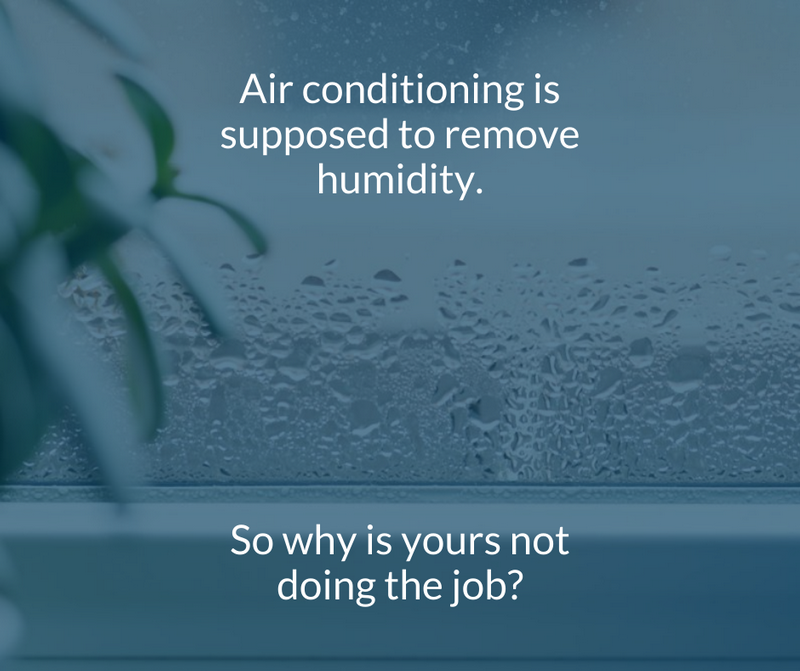
7. Shortened Lifespan:
All of the aforementioned effects of high humidity, from mold growth to increased wear and tear, can contribute to a shortened lifespan of your air conditioner. Regular maintenance and addressing humidity-related issues can help prolong the life of your unit.
It is important to monitor and address humidity levels in your home to prevent these long-term effects on your air conditioner. Regular maintenance, such as cleaning or changing air filters, checking for leaks, and ensuring proper ventilation, can help mitigate the impact of high humidity on your unit.
How to Control Humidity Levels
Controlling humidity levels in your environment is essential for maintaining a comfortable and healthy indoor atmosphere. Here are some effective ways to control humidity levels:
- Use a Dehumidifier: A dehumidifier is a device that removes excess moisture from the air. It works by pulling in humid air, cooling it, and condensing the water vapor. The condensed water is then collected in a tank, and dry air is released back into the room. Dehumidifiers are particularly useful in areas with high humidity levels.
- Open Windows and Doors: Allowing fresh air to circulate in your space can help reduce humidity levels. Opening windows and doors, especially during dry and breezy weather, will help promote air circulation and decrease moisture levels in the air.
- Use Ventilation Fans: Ventilation fans, such as bathroom fans and kitchen range hoods, can help remove excess moisture from the air. Turning on these fans while cooking, showering, or doing laundry can effectively control humidity levels in specific areas of your home.
- Avoid Overwatering Plants: Indoor plants release moisture through a process called transpiration. Overwatering plants can increase humidity levels in your space. Be sure to water your plants only when necessary and avoid excessive watering.
- Repair Leaks and Seal Cracks: Moisture can enter your home through leaks and cracks in the walls, windows, and doors. Regularly inspect your home and promptly repair any leaks or seal cracks to prevent excess moisture from seeping in.
- Use Air Conditioners: Air conditioners not only cool the air but also help remove humidity. When you use an air conditioner, the evaporator coil cools the air, causing moisture to condense and collect in a drain pan. Regularly clean and maintain your air conditioner to ensure it effectively controls humidity levels.
- Use a Hygrometer: A hygrometer is a device used to measure humidity levels in the air. By using a hygrometer, you can monitor and maintain the ideal humidity range of 30-50%. When humidity levels exceed this range, you can take appropriate actions to control moisture in your environment.
By implementing these measures, you can effectively control humidity levels in your space and ensure a comfortable and healthy indoor atmosphere.
Using Dehumidifiers to Improve Air Conditioner Efficiency
High humidity can negatively impact the performance of your air conditioner. When the air is too humid, your air conditioner has to work harder to remove the moisture from the air before it can cool it down. This can lead to excessive energy consumption and reduced efficiency of your cooling system.
One effective way to improve the efficiency of your air conditioner in humid conditions is to use a dehumidifier. A dehumidifier is a device that removes excess moisture from the air, reducing the humidity level. By using a dehumidifier in conjunction with your air conditioner, you can create a more comfortable and energy-efficient indoor environment.
Here are some benefits of using dehumidifiers to improve air conditioner efficiency:
- Reduced workload: By removing excess moisture from the air before it reaches your air conditioner, a dehumidifier relieves some of the workload from your cooling system. This allows your air conditioner to cool the air more efficiently and effectively.
- Energy savings: When your air conditioner doesn’t have to work as hard to remove moisture, it consumes less energy. This can lead to significant energy savings, especially during hot and humid summer months when your air conditioner is running for extended periods.
- Improved indoor air quality: High humidity can create an environment that is conducive to mold growth and the proliferation of dust mites. Using a dehumidifier helps to reduce the moisture level, which in turn can help prevent the growth of mold and the spread of allergens, resulting in improved indoor air quality.
When using a dehumidifier to improve air conditioner efficiency, it’s important to choose the right size and capacity for your space. Consider the square footage of the area you want to dehumidify and the desired humidity level. Additionally, proper maintenance and regular cleaning of your dehumidifier are essential to ensure its optimal performance.
In conclusion, using a dehumidifier alongside your air conditioner can significantly improve its efficiency in humid conditions. It reduces the workload on your cooling system, saves energy, and contributes to a healthier indoor environment. Invest in a quality dehumidifier to enhance the performance of your air conditioner and enjoy more comfortable living conditions all year round.
Humidity Considerations for Air Conditioner Maintenance
Humidity plays a crucial role in the performance and maintenance of your air conditioner. High levels of humidity can impact the efficiency of your cooling system and potentially lead to a variety of issues. Understanding how humidity affects your air conditioner can help you ensure its optimal performance and prevent costly repairs.
Condensation
Humidity levels directly affect condensation within your air conditioner. When the outside air is humid, moisture can easily accumulate on the evaporator coils, condensate drain lines, and other components of your air conditioner. This excess moisture can lead to mold and mildew growth, which can affect indoor air quality and pose health risks.
Airflow
Humidity can also impact the airflow of your air conditioner. When the relative humidity is high, the air feels heavier and more difficult to move. This can put a strain on your air conditioner’s blower motor, causing it to work harder and potentially leading to premature failure. Additionally, high humidity can reduce the effectiveness of your air filter, allowing more particles and contaminants to circulate in your home.
Energy Efficiency
High humidity can reduce the energy efficiency of your air conditioner. When the air is humid, it feels warmer than it actually is, causing you to lower the thermostat setting and run your air conditioner more frequently. This can significantly increase your energy consumption and utility bills. Additionally, excessive moisture in the air can make your air conditioner work harder to remove it, resulting in a higher energy expenditure.
Maintenance Tips
To maintain your air conditioner in humid conditions, consider the following tips:
- Keep your home well-insulated to minimize the entry of humid air.
- Ensure proper ventilation by using exhaust fans in high-moisture areas like bathrooms and kitchens.
- Regularly clean and replace your air filters to prevent clogs caused by excessive humidity.
- Have your air conditioner inspected and maintained by a professional at least once a year.
- Consider using a dehumidifier to remove excess moisture from the air.
- Use ceiling fans or portable fans to improve airflow and help your air conditioner cool more efficiently.
Conclusion
Humidity plays a crucial role in the performance and maintenance of your air conditioner. High humidity levels can cause condensation, reduce airflow, decrease energy efficiency, and lead to various problems. By understanding the impact of humidity on your air conditioner and following maintenance tips, you can ensure its optimal functioning and prolong its lifespan.
Preventing Mold and Mildew in High Humidity
High humidity can create the perfect environment for mold and mildew growth. These fungi thrive in moist conditions, and when combined with warm temperatures, they can quickly spread and cause damage to your home. To prevent mold and mildew growth in high humidity, it is essential to take proactive measures and maintain a proper indoor environment.
Here are some tips to prevent mold and mildew in high humidity:
- Monitor indoor humidity levels: Use a hygrometer to measure the humidity levels in your home. Ideally, indoor humidity should be kept between 30% and 50%. If the humidity level exceeds this range, consider using a dehumidifier.
- Ensure proper ventilation: Good air circulation can help prevent the buildup of moisture in your home. Use exhaust fans in bathrooms and the kitchen to remove excess humidity. Open windows when weather permits to allow fresh air to circulate.
- Fix leaks and damp areas: Moisture from leaks or damp areas can contribute to mold and mildew growth. Regularly inspect your home for any water leaks or damp spots, and promptly repair them.
- Use a mold-resistant paint: In areas prone to high humidity, such as bathrooms or basements, consider using a mold-resistant paint. This type of paint contains additives that inhibit the growth of mold and mildew.
- Keep indoor surfaces clean and dry: Regularly clean and dry surfaces such as countertops, walls, and floors. Avoid leaving wet or damp items lying around, as they can promote mold and mildew growth.
- Use natural mold inhibitors: Some natural substances, like vinegar or tea tree oil, have antifungal properties that can help prevent mold and mildew. Dilute vinegar with water and use it to clean mold-prone areas. You can also add a few drops of tea tree oil to water and use it as a natural mold inhibitor.
- Inspect and clean your air conditioner: Regularly inspect your air conditioner for any signs of mold or mildew, such as a musty odor or visible growth. Clean or replace filters as needed and have your unit professionally serviced to ensure proper functioning and airflow.
By following these tips, you can significantly reduce the risk of mold and mildew growth in high humidity. Remember to maintain a clean and dry indoor environment, monitor humidity levels, and take proactive measures to prevent excess moisture buildup. By doing so, you can protect your home and ensure the optimal performance of your air conditioner.
The Role of Air Filters in Humidity Control
Air filters play a crucial role in controlling humidity levels in your air conditioner. They help remove excess moisture from the air, preventing it from circulating back into your home or building.
When the humidity level is high, air filters absorb the excess moisture and trap it within the filter media. This prevents the moisture from reaching the evaporator coils and condensing, which can lead to water leaks and damage to the air conditioning system.
Additionally, air filters also help improve indoor air quality by trapping airborne particles such as dust, pollen, and pet dander. These particles can contribute to the growth of mold and mildew, which thrive in humid environments. By reducing the humidity and trapping these particles, air filters not only help maintain a comfortable indoor environment but also promote better respiratory health.
It’s important to regularly replace or clean your air filters to ensure their effectiveness. Over time, air filters can become clogged with debris and lose their ability to control humidity effectively. A clogged filter can restrict airflow and reduce the efficiency of your air conditioner, leading to higher energy consumption and potentially causing the system to overheat.
There are different types of air filters available, ranging from basic fiberglass filters to high-efficiency options like HEPA filters. The type of filter you choose will depend on your specific needs, such as allergy concerns or the level of humidity in your area.
In addition to using air filters, other methods of controlling humidity include using dehumidifiers and ensuring proper ventilation in your home or building. By combining these strategies, you can effectively manage the humidity levels and optimize the performance of your air conditioner.
| Control excess moisture | Prevents moisture from reaching the evaporator coils and causing water leaks |
| Improve indoor air quality | Traps dust, pollen, and pet dander, reducing the growth of mold and promoting better respiratory health |
| Energy efficiency | Prevents clogged filters from restricting airflow and decreasing the efficiency of the air conditioning system |
| Flexibility in filter options | Choose the right filter type based on specific needs and humidity levels |
Common Signs of Humidity-related Air Conditioner Issues
High humidity can cause various issues with your air conditioner. Here are some common signs that indicate humidity-related problems:
-
Excessive moisture in the air: If you notice that the air in your home feels damp or sticky, even when the air conditioner is running, it could be a sign of high humidity levels. This can make it difficult for the air conditioner to effectively remove moisture from the air.
-
Condensation on windows: When humidity levels are high, you may notice condensation forming on your windows. This occurs when the warm air outside comes in contact with the cool glass surface, causing water droplets to form. Excessive condensation can be a sign that your air conditioner is struggling to control humidity.
-
Musty odors: High humidity can contribute to the growth of mold and mildew in your home. If you start noticing a musty smell, especially near vents and air filters, it could be a sign of excess moisture in the air. Mold and mildew growth not only affects air quality but can also damage your air conditioner.
-
Inconsistent cooling: If your air conditioner is having trouble dehumidifying the air, it may struggle to maintain consistent cooling throughout your home. You may notice certain areas feeling warmer or more humid than others, even when the air conditioner is running.
-
Frequent filter clogging: When humidity levels are high, your air conditioner has to work harder to remove moisture from the air. This can result in your air filters getting clogged more frequently than usual. If you find yourself having to clean or replace your filters more often, it might be a sign of humidity-related issues.
-
Increased energy consumption: When humidity levels are high, your air conditioner needs to run for longer periods to cool and dehumidify your home. This can lead to increased energy consumption and higher utility bills. If you notice a sudden spike in your energy costs, it could be due to humidity-related air conditioner issues.
If you are experiencing any of these signs, it is important to address the humidity-related issues with your air conditioner as soon as possible. Regular maintenance, proper insulation, and the use of dehumidifiers can help improve the performance of your air conditioner and maintain comfortable humidity levels in your home.
Professional Solutions for High Humidity Problems
Excessive humidity can cause a variety of issues in your home, including discomfort, health problems, and damage to your property. If you’re struggling with high humidity levels, it may be time to consider professional solutions to address this problem. Here are some effective options:
- Dehumidifiers: Installing a dehumidifier is one of the most common and effective solutions for high humidity problems. These devices remove excess moisture from the air, helping to maintain a comfortable and healthy indoor environment.
- Ventilation systems: Good ventilation is crucial for reducing humidity levels. Installing a whole-house ventilation system can help to control humidity by introducing fresh air and exhausting stale, moist air from your home.
- Air conditioning systems: Air conditioners not only cool the air but also remove moisture from it. Investing in a high-efficiency air conditioner can effectively lower humidity levels in your home while providing optimal comfort during hot and humid days.
- Air sealing and insulation: Proper insulation and air sealing can help prevent excess moisture from entering your home. By sealing gaps and cracks and improving insulation, you can reduce the risk of condensation and moisture buildup, which contribute to high humidity levels.
Note: It’s important to consult with a professional HVAC technician or contractor to assess your specific situation and recommend the best solution for your high humidity problems. They can help determine the underlying cause of the humidity, such as poor ventilation or inadequate insulation, and provide targeted solutions to address the problem effectively.
Remember, addressing high humidity problems can improve indoor air quality, prevent mold growth, and enhance overall comfort in your home. Don’t hesitate to seek professional assistance to ensure a healthy and moisture-free living environment.
Question-answer:
What is humidity and how does it affect air conditioner performance?
Humidity is the amount of moisture present in the air. High humidity can make it harder for air conditioners to cool the air effectively, as they have to work harder to remove the moisture before cooling the air. This can result in decreased efficiency and increased energy consumption.
Can an air conditioner help reduce humidity in the air?
Yes, an air conditioner can help reduce humidity in the air. When the air conditioning unit cools the air, it also removes some of the moisture, lowering the humidity level in the room. However, if the humidity is extremely high, the air conditioner may struggle to keep up and may not be able to effectively dehumidify the room.
What can happen if an air conditioner is not properly maintained in high humidity?
If an air conditioner is not properly maintained in high humidity, it can lead to several issues. The excess moisture in the air can cause mold and mildew growth in the unit, leading to unpleasant odors and potential health problems. The air conditioner may also have reduced cooling capacity and increased energy consumption, as it has to work harder to remove the moisture from the air. Additionally, the excess humidity can cause condensation and water damage to the surrounding area.

